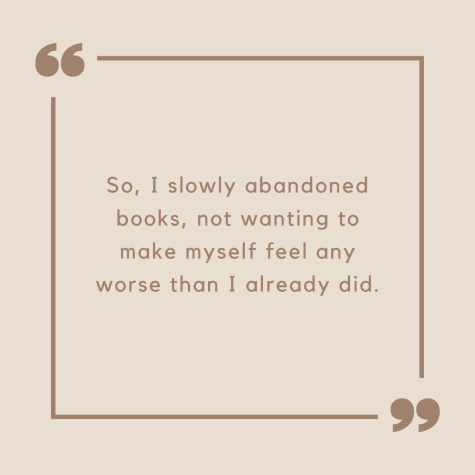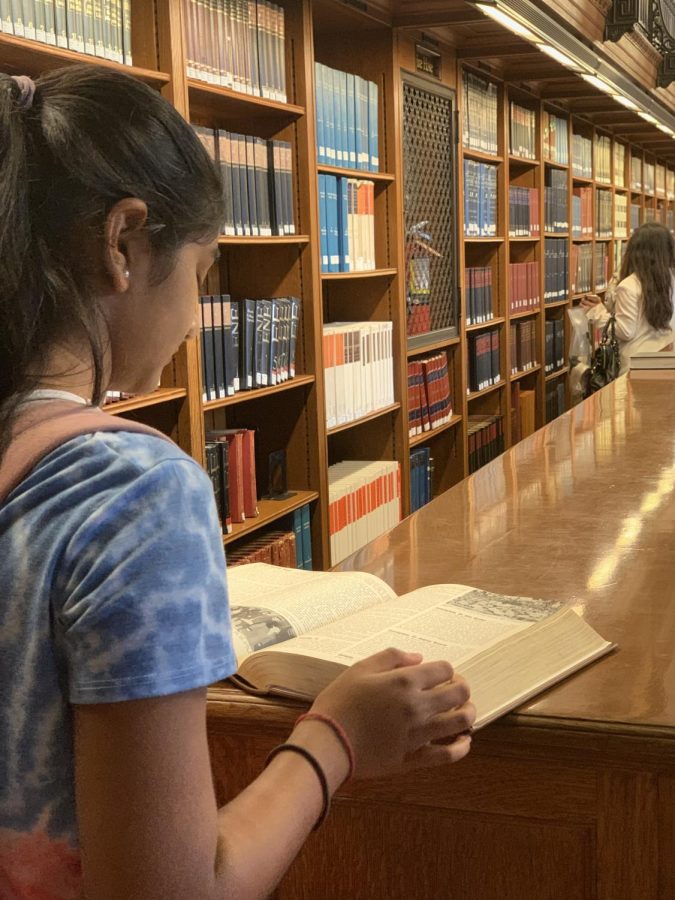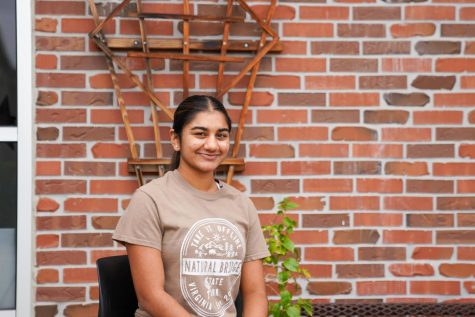Picking up the pages
Learning to find comfort in books once again
As a kid, I loved books. However, the farther I got into high school, the more I lost my passion for reading.
November 13, 2022
The words of the book on my lap spiraled around me as I read through the slow city scene detailed in the pages in front of me. The characters laughed, cheered and chattered excitedly as they clung to each other while skipping down the brightly lit sidewalks. But their bright elation was contrasted by my equally dark frustration as I felt tendrils of jealousy slowly begin to wrap themselves around me. Disgruntled by the exciting lives of the characters I was reading about, I put my book down and picked up my laptop, once again consumed by the stress-inducing essay I’d been attempting to write for hours, as far away from fun and happiness as I could be.
I’ve been a major bibliophile my entire life: my parents would always say that books and I were attached at our real and imagined hips. At every free moment I had, the tinkling notes from my reading playlist filled the air, and I was transported to the fantastical worlds crafted within novels. When I first entered high school, they were my method of escape from the unfamiliar academic pressure. The second I settled into the comfortable reading bean bag in my room and flipped through well-worn, textured paper pages, I felt my stress slip away.
However, books soon began to take on a different role in my life. The more I read, the more I encountered characters who were living life to the fullest and achieving everything they wanted. I, on the other hand, was trying my very best to stay afloat. The transition to high school was proving to be rocky, and I was struggling to manage my strenuous classes, sleep, extracurriculars and social life without crashing and burning. The characters in my books would go out to cafes after school, sipping on hand-crafted drinks and working on their math homework with light music in the background. I’d come home from school exhausted, gulping down the strongest cup of coffee I could find before trapping myself in my room with my work and suffocating silence. The characters in my books would spend all weekend outside, going on hikes or exploring the grand cities they lived in. I ventured out during the weekend too, all the way to the quiet study room at the back of the library.
I found it impossible to believe that the characters in the books I read were working just a few hours a day and going out with their friends every night while simultaneously being Ivy League-bound. Thus, I began to dislike books for giving me false realities that I knew I’d never be able to live up to. Sure, one part of me understood that the books and their characters were fiction, but they were somewhat based on reality. If these characters, who were supposed to represent members of real communities, could do it all and I couldn’t, I thought it meant that I was failing as a student and a teenager. And I hated that thought. So I slowly abandoned books, not wanting to make myself feel any worse than I already did.

The only pages I read during my freshman year were the ones in my textbooks and required reading. The only imaginative worlds I entered were the anxious dreams I had about doing well on my tests. But when the pandemic hit, my life became monotonous and completely schoolwork-less. Unused to this sudden lack of pressure, I tried my best to find ways to engage myself. However, lazily scrolling through TikTok and walking aimlessly around my house got old pretty quickly, and surprisingly, my interest in revisiting my source of comfort began to pique. Cautiously, and to get rid of some of the major boredom I was feeling, I began to read again. I enjoyed it so much that I couldn’t stop: once again, I was reading all the time, every second I could. However, I wasn’t feeling the familiar sense of FOMO that I did back in freshman year as I read.
This time, now that I had the room to enjoy books without academic stress and a constant feeling that they contributed to a deepening sense of failure, I found myself thinking about them in a different way. Instead of viewing characters and their lives as unrealistic ideals that I’d never be able to achieve, I started to learn from the actions and routines to at least try to create a better lifestyle for myself. And it worked. From the incredible students I read about, I learned how to build a better work-life balance by starting on school work well in advance and making sure to dedicate some time each week to spending time with those that I held close to me so that I, too, could do it all. From those city adventurers, I learned to laugh at everything, to find excitement in every nook and corner. And from the adorable, blossoming teen romances, I felt and understood emotion and happiness on a deeper level.
With every book I read, I learn a little more about the way I can shape my routines to be most conducive to helping me experience enjoyment along with my academic workload. I’ve begun to turn to books for guidance on everything, whether it’s study tips, working through difficult times or learning how to build a true, natural character. By finding snippets of reality within the fiction I read, books have now become my greatest mentors.

















